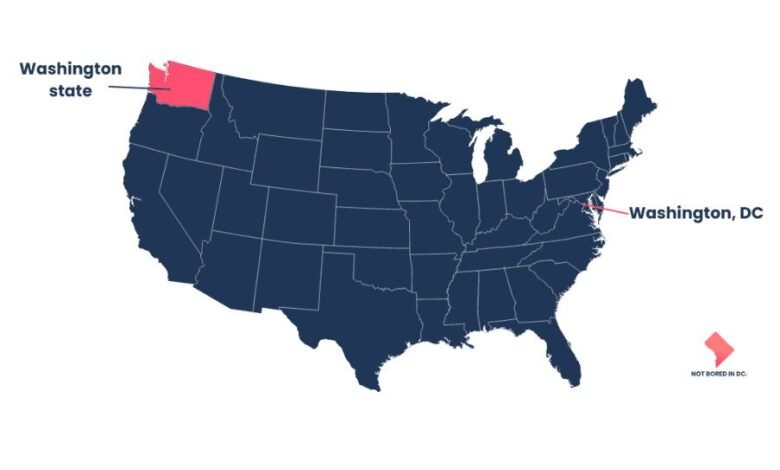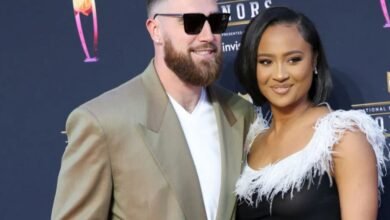
Many people wonder, “What state is Washington DC in?” The answer might surprise you. Washington DC is not in any state. It is a separate federal district, officially known as the District of Columbia. The city serves as the capital of the United States and has a unique status, different from all 50 states.
This article will explain why Washington DC is not part of any state, how it was established, and its political significance. Let’s explore the history, governance, and key facts about Washington DC in detail.
Why Isn’t Washington DC in a State?
Washington DC was created to be independent of any state. The Founding Fathers wanted the U.S. capital to be neutral, without giving any one state too much power. This decision led to the creation of a separate district governed by Congress.
The Reason for a Federal District
The U.S. Constitution states that the capital should not be in any state. Article 1, Section 8, Clause 17 gives Congress the power to create a “District” for the seat of government. This was to avoid conflicts between states and ensure that no state could control the federal government.
The History Behind Washington DC’s Location
The Residence Act of 1790
In 1790, the U.S. Congress passed the Residence Act, which established a new national capital along the Potomac River. President George Washington selected the exact location, which was originally 100 square miles and included land from both Maryland and Virginia.
Land Given by Maryland and Virginia
The land given for the district included the cities of Alexandria, Georgetown, and parts of Maryland and Virginia. However, in 1846, Virginia’s portion was returned in an event known as retrocession. This left Washington DC with only the land donated by Maryland.
The Construction of the Capital
Pierre Charles L’Enfant, a French-American engineer, designed the layout of Washington DC. His plan included grand avenues, important buildings, and landmarks such as the White House and the Capitol Building.
How Big is Washington DC?

Washington DC covers 68 square miles (177 km²) today. This is smaller than any U.S. state but larger than some major cities. Despite its small size, it has a population of over 700,000 people, which is more than the population of Vermont and Wyoming.
Population Growth Over the Years
- 1800: About 8,000 people
- 1900: Around 278,000 people
- 2020: Over 700,000 residents
Is Washington DC a State?
No, Washington DC is not a state. It is a federal district. However, there have been efforts to make DC a state, known as the DC Statehood Movement. Supporters argue that residents should have full representation in Congress.
Who Governs Washington DC?
Washington DC has its own mayor and city council, but Congress has the final authority over its laws. Unlike states, DC does not have voting representation in the U.S. Senate or House of Representatives.
Key Government Officials in DC
- Mayor of Washington DC: Oversees local governance.
- City Council: Makes laws for the district.
- Delegate to the U.S. House: Represents DC but cannot vote on final legislation.
Do People in Washington DC Pay Taxes?
Yes! Even though Washington DC is not a state, its residents pay federal taxes, just like people in the 50 states. However, they have limited representation in Congress, which has led to the slogan: “Taxation Without Representation.”
The Taxation Issue
- DC residents pay income tax, sales tax, and property tax.
- They contribute billions in federal taxes but have no voting power in Congress.
- This is one of the main reasons behind the DC Statehood Movement.
The Push for Washington DC Statehood
Many people believe Washington DC should become a state. The main reasons include:
- Over 700,000 residents live there, more than in some states.
- DC residents pay federal taxes but have no voting representation in Congress.
- Statehood would give DC two Senators and full voting rights in the House of Representatives.
Opposition to Statehood
- The U.S. Constitution established DC as a separate district.
- Statehood would require a constitutional amendment.
- Some argue that it could create political imbalances.
Washington DC’s Role in U.S. Politics
Washington DC is home to all three branches of the federal government:
- Legislative Branch: The U.S. Congress meets at the Capitol Building.
- Executive Branch: The White House is the residence of the President.
- Judicial Branch: The U.S. Supreme Court interprets laws.
Read Next: Entertaincraze
Famous Landmarks in Washington DC
Washington DC is filled with important landmarks, including:
- The White House – Home of the U.S. President.
- The Capitol Building – Where Congress meets.
- The Lincoln Memorial – Honoring Abraham Lincoln.
- The Washington Monument – A tribute to George Washington.
- The Smithsonian Museums – The largest museum complex in the world.
- The Supreme Court – The highest court in the U.S.
Interesting Facts About Washington DC
- Washington DC was named after George Washington and Christopher Columbus (District of Columbia).
- The city has no skyscrapers because a law limits building heights.
- Washington DC has more museums than any other U.S. city.
- The National Mall is not a shopping center but a park with monuments.
The Debate on Voting Rights for DC Residents

Washington DC residents can vote for the President of the United States, but they do not have full representation in Congress.
Possible Solutions
- Grant Statehood – Make Washington DC the 51st state.
- Give DC residents representation – Allow them to vote in Congress without making it a state.
- Return DC to Maryland – This would let DC residents vote in Maryland’s congressional elections.
What Would Happen if Washington DC Became a State?
If Washington DC became a state:
- It would have two U.S. Senators.
- It would have at least one Representative in the House.
- The federal government would likely keep control of federal buildings and the National Mall.
Conclusion
So, what state is Washington DC in? The answer is: none! Washington DC is an independent federal district, not part of any U.S. state. It was created to serve as the nation’s capital, separate from state influence.
Even though Washington DC is not a state, it plays a crucial role in U.S. politics and governance. The debate over its statehood continues, and many residents hope for full voting rights in the future.
Understanding Washington DC’s unique status helps us appreciate its history, governance, and ongoing discussions about its future. What do you think? Should Washington DC become a state?
FAQs
Q: What state is Washington DC in?
A: Washington DC is not in any state. It is a federal district, separate from all 50 states.
Q: Why is Washington DC not part of a state?
A: The U.S. Constitution established DC as an independent district to prevent any state from having too much power over the federal government.
Q: Do people in Washington DC have representation in Congress?
A: DC residents have a delegate in the House of Representatives but no voting power in Congress. They also have no Senators.
Q: Do Washington DC residents pay federal taxes?
A: Yes, DC residents pay federal taxes, just like all U.S. citizens, despite having limited representation in Congress.
Q: Has Washington DC always been this size?
A: No, originally, DC included land from both Maryland and Virginia. In 1846, Virginia’s portion was returned.
Q: Can Washington DC become a state?
A: Yes, but it would require approval from Congress and likely a constitutional amendment. The debate over statehood continues.
Q: What is the main argument for DC statehood?
A: Supporters argue that DC residents pay taxes and deserve full representation in Congress, like other U.S. citizens.
Don’t Miss Out: Chegg-Free-Trial





